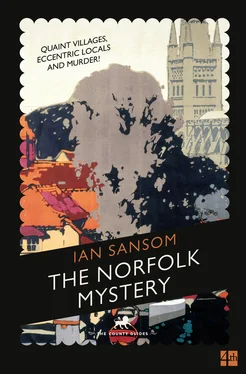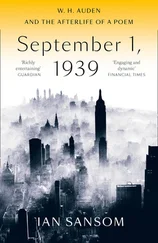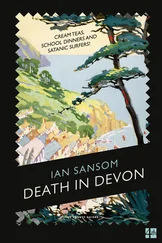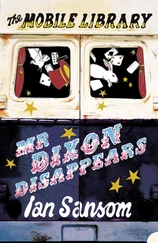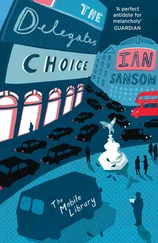‘It may have been, sir.’
‘Well, we don’t.’
‘No,’ I agreed.
‘Cup of hot water with a slice of lemon. Bowl of oatmeal,’ said Morley, tapping his spoon decisively on the side of his bowl. ‘Sets a man up for the day. Full of goodness, oatmeal. Steel-cut. Pure as driven snow.’
‘Pass the sugar, would you?’ said Miriam. ‘Indispensable, wouldn’t you say, Sefton? Utterly tasteless without, isn’t it? Like eating gruel.’
‘Gruel? Gruel?’ said Morley, before embarking on a short excursion on the history of the word, punctuated by Miriam’s protests and my own occasional weary agreements.
It was the morning after the night before, and I was enjoying my first taste of breakfast in the dining room at St George’s, which was not a household, I came to realise, that liked to ease its way into the day. There was neither a halt nor indeed even a pause in the relentless clamour of argument and quarrelling that echoed around the place like trains at a continental railway station. The conversation – to quote Sir Francis Bacon, or possibly Dr Johnson, or Hazlitt, certainly one of the great English essayists, who Morley liked to quote at every opportunity, and who I now, in turn, like to misquote – was like a fire lit early to warm the day and once lit was inextinguishable. Even when engaged in apparently casual conversation, Morley and his daughter exchanged verbal thrusts and parries that could be shocking to the outsider. For his part, Morley was not a man who brooked much disagreement, and his daughter was not a woman who liked to be bested in argument: and so the sparks would fly. All houses, of course, have an atmosphere – some pleasant, some not so pleasant, and some merely strange, no matter how humble nor how grand. The atmosphere of St George’s was one of a noisy Academy, presided over by Socrates and his rebellious daughter.
‘Sleep well?’
‘He’s not a child, Father. “A dry bed deserves a boiled sweet.”’
‘Sorry, I—’
‘Ignore her, Sefton. She only does it to provoke.’
‘Are you feeling provoked, Sefton?’ asked Miriam.
‘Erm. No. I don’t think so.’
‘Good,’ said Morley. ‘ Dies faustus , eh? Dies faustus ! All set?’
‘I think so, Mr Morley.’
‘Good, good. First day. Gradus ad Parnassum . Miriam will be driving us, in the Lagonda.’
‘Very well.’
‘Until you get the hang of it.’
‘Get the hang of it!’ snorted Miriam.
‘Anyway, I thought it would be nice for you to accompany us on the first outing. And I’ll need to brief Mr Sefton properly.’
‘Brief him? It’s hardly a military operation, Father.’
‘Have you exercised, Sefton?’
‘Not this morning, sir, no.’
‘Pity. Never mind. No time now. But in future I’ll expect you to be in fine fettle for our little trips. You’re welcome to use the swimming pool, you know. Down by the orchard.’
‘Thank you.’
‘Not at all. You have a bathing gown?’
‘No, I’m afraid my clothes … I left my luggage on the train.’
‘I see.’ He eyed my blue serge suit with a tailor’s precision, his eyes like tiny chalks.
‘Oh. We’ll have to see what we can do. I think we might have some clothes that fit you. Miriam, do you think?’ They both looked me up and down.
‘About the same height,’ said Miriam.
‘Same build,’ agreed Morley. ‘You know where the clothes are?’
‘Yes, Father.’ Miriam sighed. There was an awkward – and unusual – silence. Miriam poured more coffee, the remains of the coffee from a flask.
‘Anyway,’ said Morley. ‘Bathing suit. I’ll lend you one of mine. Fifty lengths, I’d say? Controlled Interval Method of training I prefer. We need you in tip-top shape. This is not going to be a holiday, you know.’
‘Of course.’
‘So,’ continued Morley, ‘let us set out, shall we, since all our party are assembled, our aims, principles and methods.’
‘Father!’
‘What?’
‘Do give the poor man a break, will you? He’s not had a cup of coffee, and you’re offering him this muck—’ She gestured towards the bowl of oatmeal.
‘Oatmeal.’
‘Muck for breakfast, and he looks like he’s half asleep.’
‘I’m fine, thank you, Miss Morley,’ I spoke up.
‘Oh, good grief, Sefton, come on. Be honest. Tell him. He’s as … as tedious as a tired horse, a railing wife, and worse than a smoky house!’
‘Shakespeare?’ said Morley.
‘Correct!’ said Miriam. ‘Play? Sefton?’
‘ Much Ado About Nothing ?’ I offered lamely.
‘ Henry IV ,’ said Miriam, simultaneously sighing and raising her eyebrows – in a manner not unlike her father’s, I would say – as though I had proved the end of civilisation.
‘Part?’ said Morley.
‘What?’ said Miriam.
‘ Henry IV part …?’
‘One,’ said Miriam. ‘Obviously.’
‘Correct,’ said Morley. ‘Now, where were we?’
‘Aims, principles—’
‘And methods,’ I said.
‘Exactly. Basic principles first, Sefton. If we’re going to meet our targets we can’t loaf.’
‘No loafing,’ I said.
‘Jolly good. And no funking.’
‘No. Funking,’ said Miriam. ‘Did you hear that, Sefton?’
I ignored her provocation.
‘Do you take a drink?’
‘Well, occasionally—’ I began.
‘And absolutely no drinking while out researching. Have I made myself clear?’
‘Abundantly, Mr Morley,’ I said, scraping the rest of my oatmeal.
‘Good, good. And let’s just remember that procrastination—’
‘Is the thief of time,’ said Miriam wearily, rolling her eyes. ‘I’m going to go and get ready, Father.’
‘Are you not ready already?’
‘In this old thing?’ Miriam smoothed down the sides of her dress, flashing her eyes at me. ‘Now, no man of any consequence would allow me to accompany him on any adventure in this old thing, would they, Mr Sefton?’
‘Erm.’
‘Miriam, please. We need to leave …’ Morley glanced up at a clock on the wall. ‘In forty-seven minutes.’
‘I’ll be ready, Father.’
‘And bring those clothes for Sefton, won’t you?’
‘I shall.’ She sighed again. ‘Now do let Sefton enjoy his breakfast. If enjoy is the right word. Which it is not.’
And with that, she flounced out.
‘I do apologise, Sefton. As I was saying to you last night: animal. Wild animal. Untamed.’
‘Quite, sir.’
‘You don’t drink coffee, do you? Didn’t have you down as a coffee man.’
‘Well, I …’
‘I’ll get cook to make some more.’
‘No, it’s fine. I’ll manage.’
‘Good. Now, where were we?’
‘Aims?’
‘Aims. Precisely. So, aim is, book about once every five weeks. That gives us a chance to get there, gen up on the place, get writing, get back here for the editing. What do you think?’
‘It’s certainly an ambitious—’
‘Though Norfolk I think we can do rather more quickly. Because a lot of it’s already up here.’ He tapped his head. ‘As far as research is concerned we’ll be relying mostly on the archive, Sefton.’
‘The archive?’
‘Yes. Here.’ He tapped his head. ‘Mostly. Archive . From the Greek and Latin for town hall, I think, isn’t it? Is that right?’
‘Probably.’ My Greek and my Latin were not always immediately to hand.
‘Yes. Denoting order, efficiency, completeness. The principles by which we work. We’ll have books with us, of course. But the books are the reserve fund, if you like.’ He smiled and stroked his moustache. ‘Up here, you see, that’s where we do the real work. It’s all about connections, our project, Sefton. Making connections. And you can only make them here.’ He tapped his head again. ‘And context, of course. Context. Very important. Topicality. The topos . Where we find it. You see. If you are digging, you don’t simply make an inventory of the things you discover. You mark the exact location where the treasures are found. Think Howard Carter, Sefton. Another of Norfolk’s sons – make a note. Like Carter we are engaged in a struggle to preserve, Sefton. To find and preserve.’ He checked his watch. ‘Forty-three minutes to departure, Sefton. I have a few things to attend to. You’ll need an overnight bag.’
Читать дальше
